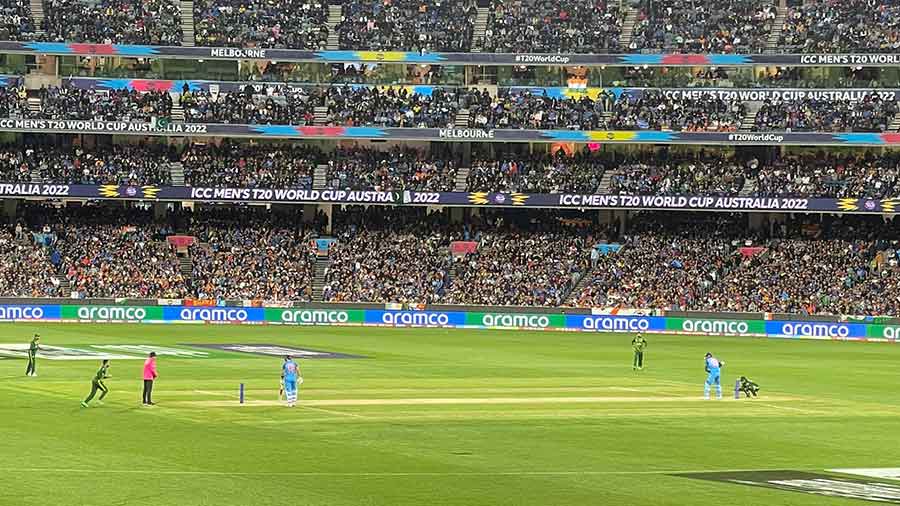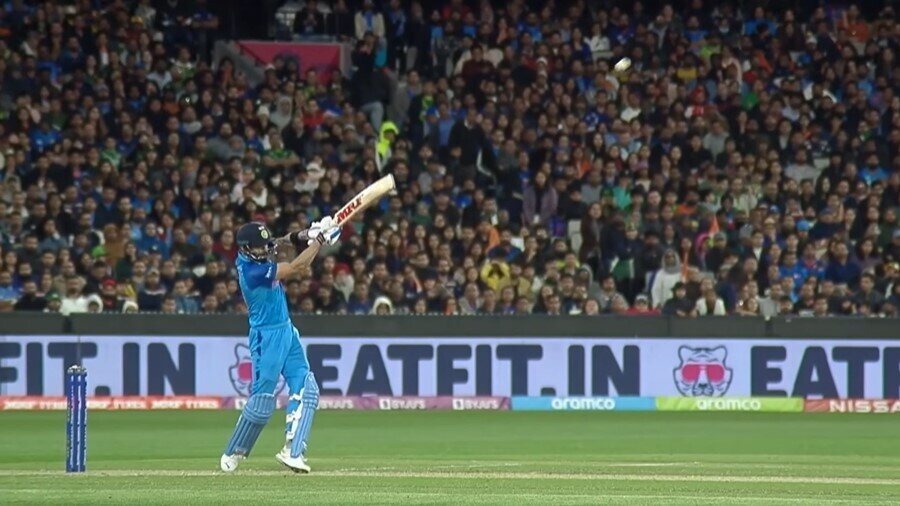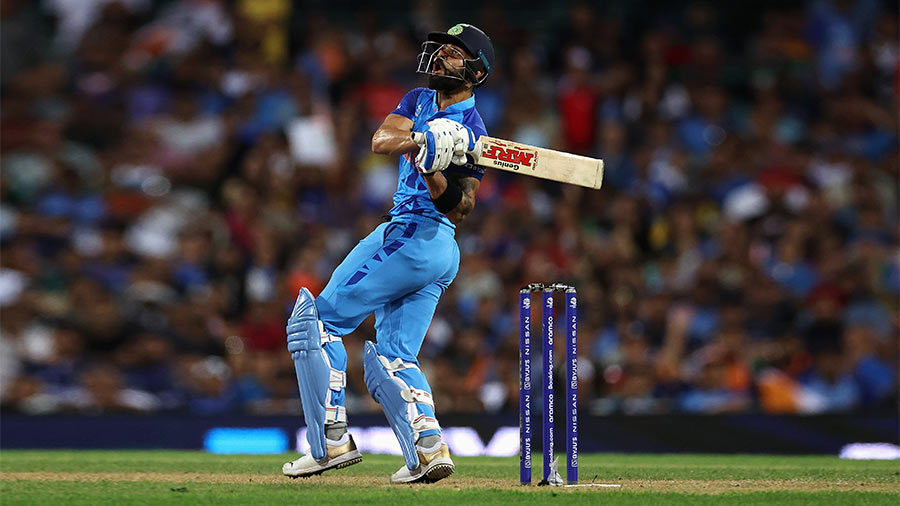“My heart is too frail to take any more drama for the night.” A young lady in our stand speaks in a muffled voice, hands covering her mouth but baring her teary eyes and the Tricolour painted on her sweaty cheekbones. Hardik Pandya has just lobbed one midway to space and back in the safe hands of Babar Azam. We look at the lady with empathy for she speaks on behalf of 90,922 others present at the Melbourne Cricket Ground (MCG). As it unfolds, we find that the drama must be endured at least five more times in as many minutes before this majestic arena erupts into equal parts ecstasy, anguish and sighs of disbelief.
A minute’s silence for those who managed to sell their tickets in anticipation of a washout
Two Pakistani fans seated ahead of me, clearly outnumbered in a quad of blue jerseys, cower with a cheeky smile and look back at us when Dinesh Karthik is out stumped: “Do we leave now, or will you let us walk out later?”
I have watched them closely for three hours and more now. They have the range of expressions a mime artist boasts of and the game has given them an opportunity to display it all. Mohammad Nawaz has now let another stray delivery down the leg side. Ravichandran Ashwin has held his nerve, and the Pakistani fans now know the answer to their own question. Before they can bolt, the crowd around them has broken into song and dance so wild that one can indeed feel the cement slabs tremble beneath their feet.
The celebrations were a long time coming. In 2021, Melbourne had lost the prestigious title of being the world’s most liveable city, gaining the dubious moniker of being the world’s most locked-down one. Earlier this year, local hero and cricketing legend Shane Warne passed away. As the city staggered through the post-pandemic return to normalcy, it grappled with an extended harsh winter and an unprecedented bout of rain that October has seldom seen before. If purchasing tickets to the India-Pakistan encounter had been a hard task, panic-selling them upon the forecast turning to that of heavy thunderstorms proved equally formidable.
A minute’s silence for those who managed to sell their tickets in anticipation of a washout. They knew not what they were going to miss.
Kohli’s magic, fluctuating fortunes and prayers on overdrive
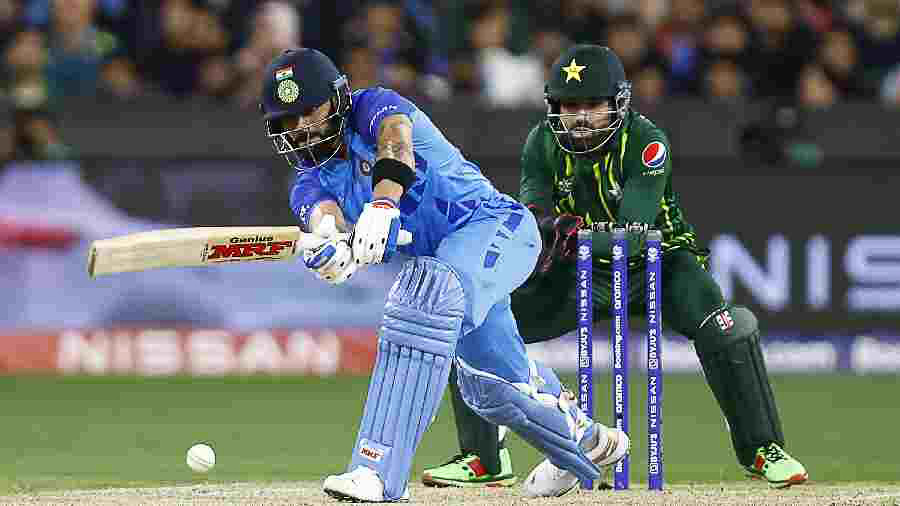
Virat Kohi played arguably the best innings of his T20I career on the night TT archives
Even the rain gods had decided to go easy for an evening and let Virat Kohli work his magic instead. His sprints between the wickets, his swirl of the bat as he eased into his stance to face the next delivery, his towering sixes — all brought with them deafening applause that acknowledged there could be no better stage for a champion to return to fine form after a long, dry spell. Prayer chants were in overdrive, the servers of most betting apps were too slow to respond and the bars and food shacks had contended there would be few patrons who would bother leaving their seats and returning for refills. Fortunes were changing with every ball, as were spectators’ seats, as was the security staff’s resolve to stop people from standing up on their chairs and blocking the view of scores of irate viewers behind them.
Complementing the pulsating atmosphere inside the stadium was a sobering observation that maybe, just maybe, the jingoism associated with a sporting event between India and Pakistan was somewhat exaggeratedly playing out before the world. This must especially be true in a setting beyond the subcontinent, in a nation where the South Asian community forms under 10 per cent of the total population, where one would nary be able to tell one tone of brown from another. Therefore, when a solo traveller aboard the train en route to the venue, who carried in her wicker basket the familiar combination of kulchas and gravy, asked us if we could take a picture that she could send to her family, we would not have imagined the picture would carry as a prop a green flag that was brandished with the same pride as our blue.
Two factions merged into one big outdoor gathering
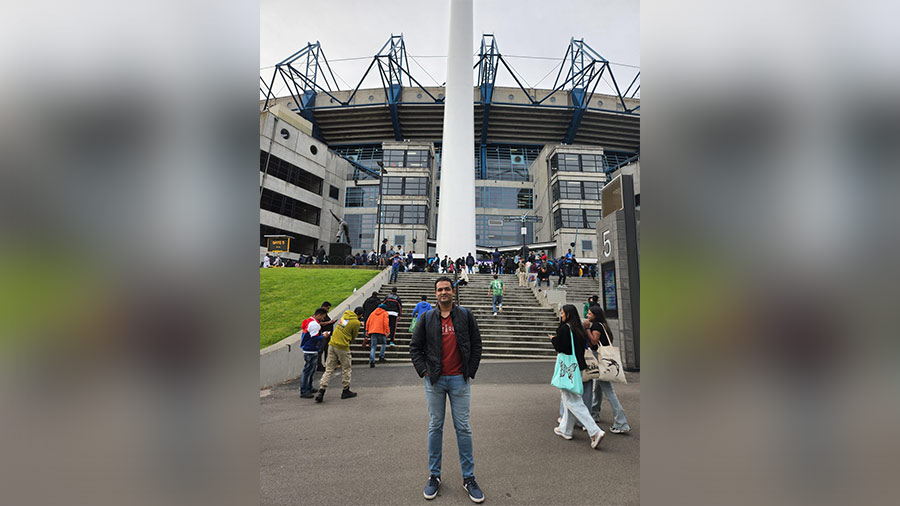
Nishant Kaushik outside the MCG prior to the match Nishant Kaushik
Outside Melbourne’s Richmond railway station, and leading up to the three-minute walk to the gates of the ground, fans of the two factions merged into one big outdoor gathering. Sprawled on the manicured lawns and under the supervision of the statues of the great Donald Bradman and Neil Harvey, people sang and danced to the tunes of Ali Sethi, Shae Gill and Sukhbir. With allegiance to one’s own country firmly tucked under one arm, they revelled with abandon and bantered with ease. Hordes of students from universities, driven by friendship and divided by motherlands, led from the front in setting patriotism apart from bigotry. All, or at least most of what they cared for, was a great game of cricket that came with its innumerable twists and turns. While the players on the turf did their bit by providing us with unbridled entertainment, the youth in the stands provided through their camaraderie an emblem of hope that tomorrow’s world will be free of the baggage of yesterday’s animosity.
Nishant Kaushik is the author of eight novels. His latest, Bhadresh Mhatre’s Slam Book, released in September 2022. He lives in Melbourne with his wife and two sons.
